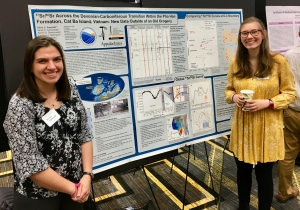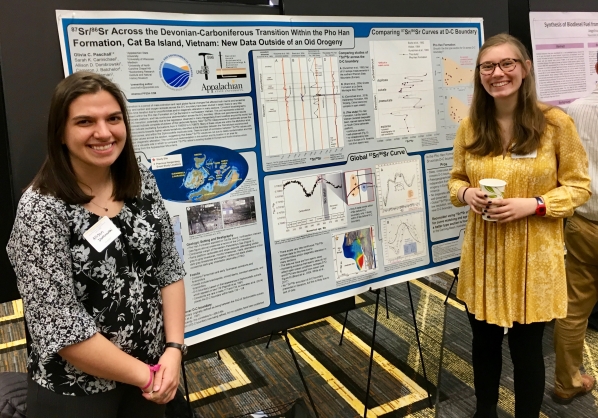Two Appalachian State University students, Olivia Paschall, a senior geology major from Grand Rapids, Michigan and Allison Dombrowski, a sophomore geology major from Raleigh, North Carolina, in the Department of Geological and Environmental Sciences, received Explorers Club student grants to travel to Mongolia to conduct geologic work as part of a combined National Geographic and Explorers Club Flag Expedition in July/August 2018 (called Looking for mass extinctions in all the "wrong" places: the Late Devonian of Mongolia). The Explorers Club student grants are very competitive and usually capped at $1500 for undergrads. However, they received $2750 and $2500 from the Explorers Club to go on the expedition as part of the 22-person international team, which is led by Dr. Sarah Carmichael and Dr. Johnny Waters in the Department of Geological and Environmental Sciences.
The Explorers Club is deeply committed to supporting the fieldwork of serious researchers and, as part of its public service commitment, offers exploration grants. The goal of these grants is to foster a new generation of explorers dedicated to the advancement of the scientific knowledge of our world. The Explorers Club considers research proposals in a wide array of disciplines, including but not limited to: climate change, geoscience, marine science, anthropology/archeology and conservation science.
Paschall and Dombrowski are both members of the DAGGER (Devonian Anoxia, Geochemistry, Geochronology and Extinction Research) group. DAGGER is an interdisciplinary, international research team focused on the systematics of mass extinctions in the Late Devonian period or roughly 360 million years ago (one of the “big 5” mass extinctions, but unlike the other major mass extinctions, the cause of it is still unknown). Dombrowski’s research characterizes the mineralogy and strontium isotope signatures of sediments from southeast and central Asia from the Middle and Late Devonian period, and she will collect additional Mongolian sediments for analysis this summer as part of her funded fieldwork. She also works in the laboratory of Dr. Drew Coleman at UNC Chapel Hill during her summer breaks to conduct strontium isotope analyses. Paschall is determining the severity of anoxia in basinal sediments from Vietnam on the south China platform at the Devonian-Carboniferous boundary using a combined geochemical and statistical method, and will be mapping the extremely complex structures of Late Devonian nearshore sediments and lava flows in Mongolia to see if they can be radiometrically dated. Ms. Paschall and Ms. Dombrowski will form an invaluable part of the science team, as they will be responsible for mapping and sampling the rocks in this remote field site for future geochemical analysis. Together, their research helps the DAGGER team determine the extent, scope and cause of Devonian extinction and the rebound of life in its aftermath.
###
About the Explorers Club
The Explorers Club is an international multidisciplinary professional society dedicated to the advancement of field research and the ideal that it is vital to preserve the instinct to explore. Since its inception in 1904, the Club has served as a meeting point and unifying force for explorers and scientists worldwide. To learn more or to and apply for grants, visit: http://grants.explorers.org.
About the Department of Geological and Environmental Sciences
Located in Western North Carolina, Appalachian State University provides the perfect setting to study geological and environmental sciences. The Department of Geological and Environmental Sciences provides students with a solid foundation on which to prepare for graduate school or build successful careers as scientists, consultants and secondary education teachers. The department offers six degree options in geology and two degree options in environmental science. Learn more at https://earth.appstate.edu.
By: Howell Keiser and Ellen Gwin Burnette
May 1, 2018
BOONE, N.C.

